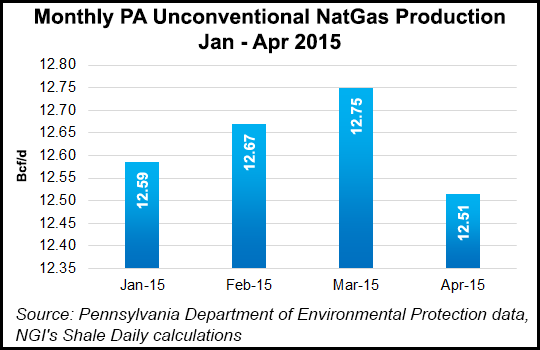Pennsylvania’s Wolf Vetoes Republican Budget, Cites Lack of Oil/Gas Severance Tax
Without hesitation Pennsylvania Gov. Tom Wolf late Tuesday vetoed the state budget sent to him by Republican lawmakers, saying it was full of “gimmicks” and one-time revenue fixes that would do little to address his top priorities, including a new severance tax on oil and natural gas production.

After budget negotiations broke down last week, GOP leaders in the House advanced a $30.1 billion budget that passed the chamber on Saturday by a vote of 112-77 (see Shale Daily, June 29). The Senate passed the budget on a complete party line vote of 30-19. It did not include a 5% severance tax on oil and natural gas production or any new taxes or tax increases, which Wolf had called for to address a more than $2 billion budget deficit and the state’s ailing public education system (see Shale Daily, Feb. 11).
“Throughout this process, I have strived to work with Republicans,” Wolf, a Democrat, said after he announced his veto late Tuesday. “I have made concessions and I have kept an open mind. “In return, Republicans have simply said no to my plan that will get Pennsylvania back on track, fix our schools, provide property tax relief and address our structural deficit.”
Wolf said when he asked about a counteroffer on his severance tax proposal, Republican leaders replied by saying “nothing, yeah nothing.” Republican leaders, however, said they fulfilled their duty to pass a budget by midnight Tuesday under state law, adding that they are prepared to continue negotiations no matter how long it takes. Wolf asked legislative leaders to meet Wednesday so that negotiations could continue in earnest.
Wolf’s administration said the full veto was the state’s first in about 40 years. Wolf’s budget proposal relied heavily on major tax reforms, including a 5% oil and natural gas severance tax and a 4.7 cent/Mcf volumetric fee that his administration estimated could eventually generate up to $1 billion — most of which would go toward public education. He proposed combined tax increases of roughly 16% mainly by raising consumption taxes.
While Wolf said the budget let the oil and gas industry off too easy, Republicans have grown increasingly cold to the idea of a severance tax, especially as oil and gas prices remain stagnant and the state continues to shed industry jobs (see Shale Daily, June 19). Instead, for the first time since it was privatized after prohibition, the General Assembly approved a bill to phase-out the state liquor system and sell hundreds of stores in a move to help generate more than $200 million annually. Lawmakers also approved a separate bill to reform the state’s underfunded pension system for public school employees and state workers that would switch them from defined benefit plans to defined contribution plans such as a 401(k).
Wolf has not signed those bills and said he would need to review them before doing so.
In defending their decision to exclude a severance tax from the budget, Republicans pointed to Halliburton Co.’s decision this week to close its Indiana County, PA, office, which affected more than 400 workers. About 90 of those jobs would be lost, while the remaining employees are expected to get offers to move with the company to its new office in southeast Ohio. Job losses across the country had been signaled by Halliburton months ago.
“They’ve been in my area since the early 1970s. Two months ago we heard a rumor that they were thinking about shutting down…Yesterday they announced that they are closing their operation in Indiana County,” said Republican state Sen. Don White, who represents the area. “When I heard that, I thought they were pulling back, laying off. No, they’re not laying off, they’re going elsewhere, and a lot of it has to do with the price of gas that we necessarily can’t control. But also, a lot of it has to do with the internal dialogue about this tax, this billion dollar tax that they would owe, not necessarily them, but the people they work for.”
Recent data suggest unconventional natural gas production in Pennsylvania may have started to decline ever so slightly, further underscoring the reduction in oil and gas activity within the Commonwealth. According to Pennsylvania Department of Environmental Protection data, and assuming the data are fully updated through the first four months of the year, Pennsylvania unconventional natural gas production in April 2015 came in at 12.51 Bcf/d, down 1.8% from March, and the first monthly decline of the current year. DEP only began keeping track of monthly production data this year.
© 2024 Natural Gas Intelligence. All rights reserved.
ISSN © 2577-9877 | ISSN © 1532-1266 | ISSN © 2158-8023 |
